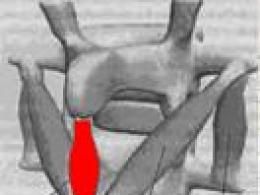Choose between protein supplements and amino acids. How protein differs from amino acids: features and differences
Not every hardened athlete knows that protein or amino acids are better, not to mention beginners. In fact, it is the same thing, it helps to solve the same problems. Is there a difference? Let's try to systematize the already existing knowledge.
Protein is the material from which our body is built. Amino acids are the building blocks of proteins. They can be taken with protein, given that these bricks are divided into:
- Essential, not produced by our body. They have to be obtained only with food or dietary supplements. There are eight of them. Among them are a branched chain of three essential amino acids: leucine, isoleucine and valine. In English it sounds like this: "branched chain amino acids". As a result, we get the abbreviation BCAA.
- Non-essential amino acids that the body makes itself. But, with high energy costs, they may not be enough. You will have to replenish stocks additionally.
What is the difference between amino acids and protein
Do not confuse amino acids and BCAAs - these are different supplements. The first of them are often sold with the name "Aminos", in which BCAAs are present, often in low concentrations. And the latter are called exclusively BCAA, and do not contain other amino acids.
The difference between amino acids and protein powder lies in several factors:
- In faster absorption. For splitting, the body does not spend extra energy.
- In the convenience of the reception. They are available in liquid and tablet form. No need to fiddle with a shaker.
- When choosing amino acids or a protein supplement, remember that amino acids can and should be consumed before training, after, and even during. There are no restrictions either in the time of day or in the preparation period.
How to take amino acids and protein
All amino acid supplements are based on protein hydrolysates. In this case, the amino acid composition can be very different. Protein and amino acids can be taken together. In this case, it is better to drink amino acids with protein powder.
When taking two products separately, transfer protein intake to morning and evening hours, consume amino acids half an hour before and immediately after training. May be taken in place of a snack if diluting the protein is inconvenient.
There is a basic rule for taking amino complexes. They need to be taken when "refueling" is urgently needed. The rate of their assimilation is much greater than the rate of assimilation of protein. This is the answer to the question: BCAA or protein, which is better. Each supplement has its own benefits. All amino acids must be taken with plenty of water.
When taking BCAAs and protein together, keep an eye on your total daily intake of protein and amino acids. Thoughtless use can lead to serious problems in the functioning of the kidneys.
Remember that some manufacturers, reducing the cost of the production technology, add more protein and reduce the amount of amino acids. Carefully read the percentage composition indicated by the manufacturer so as not to pay for a pacifier.
Master of all site and fitness trainer | more >>
Genus. 1984 Trained since 1999. Trained since 2007. CCM in powerlifting. Champion of Russia and the South of Russia according to AWPC. Champion of the Krasnodar Territory according to IPF. 1st category in weightlifting. 2-time winner of the championship of the Krasnodar Territory in t / a. Author of over 700 articles on fitness and amateur athleticism. Author and co-author of 5 books.
Place in : out of competition ()
The date: 2014-10-26 Views: 51 036 Grade: 5.0

Let me clarify what I mean by amino acids. That is, such complexes where all amino acids are present. Do not confuse with or individual amino acids.
So protein is protein. Protein is amino acids. So protein is amino acids. In other words, amino acid complexes do not fundamentally differ from protein. This means that there are still small differences. I will talk about them now.
Benefits of Amino Acids
1. Amino acids don't need to be digested
This means that amino acid complexes are absorbed much faster than protein. Since the protein must first be broken down into amino acids. The time difference is not very significant. Approximately 1 hour (highly dependent on ). For the body and for progress, this difference is not critical. Therefore, although this is a plus of amino acids, it is not significant.
2. Amino acids are lower in fat and carbohydrates
Most of the amino acids are pure amino acids without impurities of fat and carbohydrates. In proteins, on average, there are 5% fat and 10% - 15% carbohydrates. Thus, amino acids are more suitable for weight loss. However, there are also proteins with a minimum content of carbohydrates and fat, which in this regard are not inferior to "amines".
3. Amino acids are more convenient to take
To take them, you do not need to have a shaker, constantly stir cocktails and then wash it all. You don’t need to constantly buy milk, which constantly turns sour in the heat, etc. You just need to put a handful of tablets in your mouth and drink it all down with water.
Protein Benefits
1. Protein is more satiating
Now in the sports nutrition market, amino acids in tablets and liquid form are not of very high quality for 50% of the range. It is always necessary to look at the composition. Everything that is written first in the line "ingredients" is used as the basis.
When you buy amino acids, you are counting on a high absorption rate, but most amino acids are compressed protein. When reading the ingredients list, most of the ingredients say whey protein concentrate, so it's just protein pressed into pill form. Then why overpay when you can buy protein?!
Amino acid complexes and proteins are interchangeable types of sports nutrition. They serve a common goal: to supply the athlete with a sufficient amount of amino acids, from which the body synthesizes its own proteins, including muscle tissue proteins. The main difference between these supplements is the different absorption rate - proteins take longer to digest. Before they pass from the gastrointestinal tract into the blood, they must be broken down into amino acids. After all, a protein (protein) is nothing more than a chain of amino acid links connected to each other.
Although proteins and amino acids- this is about the same thing and the body uses them in the same way, there are some differences between the use of amino acid complexes and protein supplements.
What are amino acid complexes good for?
Amino acids are digested faster than proteins. Proteins must first be broken down into their constituent "bricks" - amino acids, which are then absorbed into the blood. But the time difference is not great. It is, on average, about an hour and is determined by the type of protein supplement.
There are fewer impurities in amino acid complexes, and most protein supplements contain carbohydrates (approximately 15%) and fats (5%). This should be taken into account by losing weight fitness lovers. But proteins, maximally purified from carbohydrate and lipid impurities, in fact, differ little in calorie content from amino acid complexes.
Amino acid supplements are more convenient to use. Swallowing a small capsule or tablet is easier than buying a shaker, stocking up on milk and constantly making smoothies.
Benefits of protein as sports nutrition
Long-term protein digestion can also be considered as an advantage of the product. If you take a protein supplement with a long absorption period at night, then amino acids will evenly flow to the muscles for most of the night - the building material for their growth and recovery.
Protein shakes fill the stomach and dull the feeling of hunger. Amino acids are not capable of this, as they are produced mainly in tablets and capsules. For fans of healthy lifestyle, seeking to get rid of extra pounds, this fact can be crucial.
Protein supplements are significantly cheaper, about one and a half times. After all, amino acids are the same protein, only subjected to additional processing, the costs of which are included in the cost of the product.
Between appointments amino acids and proteins there is no significant difference. Each athlete decides for himself which sports nutrition to prefer. Many people choose protein powders because of their relatively low cost.
Having stopped your choice on amino acids, you should acquire the full complex of these compounds - that was what was discussed. Sports nutrition like BCAA, that is, consisting of several amino acids, is used for other purposes.
Many novice athletes are wondering: what is better to take - amino acids or protein?
Let's take a look at this issue briefly. Protein is commonly referred to as a high-protein powder mixture, which may also contain some fat and carbohydrates. Amino acids in the common people are called that protein, but in tablets (less often - in the form of a liquid). Protein (often referred to as the same protein) - consists of amino acids.
There is an opinion that amino acids (i.e. protein in the form of tablets / liquid) are more effective than protein, but in 99% of cases this is not the case. Let's briefly explain why. The mythical "brutal" effectiveness of amino acids has developed from the belief that they are more quickly and completely absorbed, and therefore it is especially important to take them after training. But! If you look at the composition of the most popular amino acid complexes, you will realize that they are all made from the same ingredients as protein powder. After analyzing the amino acid composition of both products (as you know, a protein consists of a complex of individual amino acids), in general, we can also conclude that it is identical. So, both types of products contain a full range of amino acids necessary for an athlete.
Let's summarize. So what is the real difference between protein and amino acids?
Because the composition of both types of products in 99% of cases is the same, it turns out that they differ only in the form of release - either powder or tablets. And nothing more. But let's look at this difference. Powder - it comes out cheaper, but it must be stirred in a shaker with liquid. It's less convenient than taking pills. It is known that after visiting the gym in a short period of time, you need to consume protein. Often this is done immediately after training, in the locker room (because by the time you get home, this important gap for protein intake will pass). And some athletes will find the consumption of a powder form of protein inconvenient, and here amino acids come to the rescue - those same tablets containing protein. Throwing a few pieces in your mouth and drinking water is more convenient than stirring a cocktail in a shaker. But the pills also have a big minus. In terms of the amount of protein, they come out more expensive, in most cases - many times more expensive. And if a scoop of protein usually contains 20-30 grams of protein, then in order to gain such an amount of protein from amino acids, in most cases you will have to swallow more than 10 pieces at a time (how much specifically - calculate for your specific product by studying the label).
In our example, when considering the differences, we cited the example of protein intake immediately after training, but this applies to any other time of day. Both protein and amino acids serve to replenish the protein deficiency at any time of the day when you did not get enough protein with regular food, no matter if it is morning, afternoon or evening.
We will also answer the popular question: is it possible to take protein and amino acids together? You can, but what's the point? Use only the powder, if it does not make it difficult for you to dilute it, and forget about the tablets. Powder is much cheaper.
IMPORTANT NOTES TO THE ARTICLE.
1) Under the amino acids, we understood exactly the products with a full complex of amino acids in the composition. There are also protein tablets containing only BCAA, some individual amino acids, but this is a completely different story and these products differ in their purpose from complex amino acids and serve other purposes.
2) We have now spoken in general, based on the composition of 99% of the products on the sports nutrition market. Yes, in the rarest cases, there are amino acids with such a degree of protein processing (complete or almost complete hydrolysis) that they are really absorbed faster and more completely, and also do not contain carbohydrates and fats at all, which is especially important for competing athletes. For most sports fans, whose bicep diameter is far from 50 cm and who are not preparing for competitions, we recommend not to bother with the use of such products. You will not feel the difference anyway, but you will throw out many times more money.
Many people interested in sports nutrition have a lot of questions: protein powders or amino acids are preferable to choose, what are their differences, can they be combined and what and how is it better to use?
In order to answer all of the above questions, you need to know what these compounds are. It's not difficult at all. It is clear that protein powders got their name due to their main components - proteins (proteins). Proteins are a construct made up of amino acids. In every protein, amino acids are linked by chemical compounds that must be broken down, that is, digested, in order for the body to assimilate them. Separately, amino acids (that is, the sports nutrition products themselves from this category) are already split into a form that is easily absorbed. That is why some athletes take amino acids and protein powders at different times.

Since amino acids are quickly absorbed, it is recommended to drink them when they are most needed - before and after training, in the morning. If it is arginine, then it should be taken before going to bed on an empty stomach. Sometimes amino acids are taken in order to enrich the daily diet, but protein powders based on casein, a protein that is absorbed by the body for several hours, are also used for this purpose, and during all this time amino acids enter the bloodstream. Therefore, casein-based protein powders are recommended to be taken at night or between meals throughout the day.

Among athletes, the most popular protein is whey. It is absorbed much faster than other types of protein, although more slowly than amino acids, so, like amino acids, it can be consumed after a workout. It is also possible to consume it during the day, whey protein, unlike amino acids, helps to maintain strong muscles and has a positive effect on the body as a whole. 
So, despite the fact that amino acids and protein powders are different products, you can still compare them. In a sense, they are interchangeable, if you change the mode of use a little. Otherwise, combinations of amino acids and proteins are the most effective and cost-effective. You can take casein and whey during the day, after training - amino acids, and at night - casein again.






